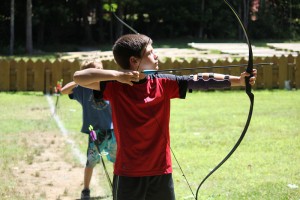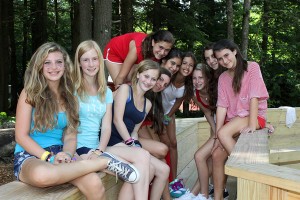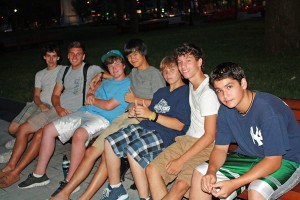 At one of America’s Finest Summer Camps, a first year camper, upon stepping off the bus on arrival day for the first time, immediately exclaimed, “I’ve been waiting for this moment my whole life!” The awe of that young camper at that moment was very reminiscent of the scene in The Little Mermaid in which the young mermaid Ariel finds herself on land for the first time and, with her new legs, begins experiencing a whole new world. She is mesmerized by the smallest human things—flatware, trinkets, and mirrors. For young campers who finally get to come to camp for the first time after sometimes waiting their “whole lives,” there is a sense of wonder in being in a new place with different people and things. They are surrounded by literally dozens of activities that perhaps they’ve never tried and, sometimes, of which they’ve never even heard. Like Ariel the mermaid, they sometimes hear about the world of camp from older siblings for years before finally getting to experience themselves. With that newness and the adventure of being in a place one has dreamed for a very long time comes a sense of openness and a willingness to try new things. New campers often want to try EVERYTHING!
At one of America’s Finest Summer Camps, a first year camper, upon stepping off the bus on arrival day for the first time, immediately exclaimed, “I’ve been waiting for this moment my whole life!” The awe of that young camper at that moment was very reminiscent of the scene in The Little Mermaid in which the young mermaid Ariel finds herself on land for the first time and, with her new legs, begins experiencing a whole new world. She is mesmerized by the smallest human things—flatware, trinkets, and mirrors. For young campers who finally get to come to camp for the first time after sometimes waiting their “whole lives,” there is a sense of wonder in being in a new place with different people and things. They are surrounded by literally dozens of activities that perhaps they’ve never tried and, sometimes, of which they’ve never even heard. Like Ariel the mermaid, they sometimes hear about the world of camp from older siblings for years before finally getting to experience themselves. With that newness and the adventure of being in a place one has dreamed for a very long time comes a sense of openness and a willingness to try new things. New campers often want to try EVERYTHING!
And why not? What better way to discover which things one loves than at summer camp, an environment in which many new campers are away from their parents for the first time? There is no sideline pressure from over-zealous parents and coaches at camp sports. There are no teachers to mark right from wrong. Instead, new campers are surrounded by supportive counselors, staff, and friends, many of whom are also first time campers and that natural empathy creates an atmosphere conducive to bonding and the formation of lasting friendships.
As campers maneuver the new world of camp, they share like experiences. Whether big, like taking on a high ropes course for the first  time as a cabin or small, like learning how to bait a fishing hook, learning what camp is all about becomes the foundation for the transformation of the new world of first time campers into the special world of camp. Because the menu of camp activities constantly expands and evolves, there is a perpetual newness to the summer camp experience. Even though, for older campers, camp becomes a special place to which campers get to journey once a year, that essence of being a whole new world lives on summer after summer and is what drives campers to spend their winters counting down for that annual journey to experience it.
time as a cabin or small, like learning how to bait a fishing hook, learning what camp is all about becomes the foundation for the transformation of the new world of first time campers into the special world of camp. Because the menu of camp activities constantly expands and evolves, there is a perpetual newness to the summer camp experience. Even though, for older campers, camp becomes a special place to which campers get to journey once a year, that essence of being a whole new world lives on summer after summer and is what drives campers to spend their winters counting down for that annual journey to experience it.

































 campers’ lives as they play in carrying on its traditions. There are a lot of camp articles that sing the praises of summer camp for young children, but few focus on the value of the camp experience for young teens. By the time many campers reach their teens, they already have several camp summers behind them. For them, it’s not really about newness anymore, but reliability and tradition: who is at camp, what is at camp, camp rites to which they’ve looked forward since they were young. In a period of child’s life that can be a roller coaster full of ups and downs that come at full speed, summer camp is oasis of stability. It’s solid ground, a safe place where teenagers go to be themselves and to let loose of the stress and strain that are inextricably part of the teenage years.
campers’ lives as they play in carrying on its traditions. There are a lot of camp articles that sing the praises of summer camp for young children, but few focus on the value of the camp experience for young teens. By the time many campers reach their teens, they already have several camp summers behind them. For them, it’s not really about newness anymore, but reliability and tradition: who is at camp, what is at camp, camp rites to which they’ve looked forward since they were young. In a period of child’s life that can be a roller coaster full of ups and downs that come at full speed, summer camp is oasis of stability. It’s solid ground, a safe place where teenagers go to be themselves and to let loose of the stress and strain that are inextricably part of the teenage years. At summer camp, teenagers can still be young while getting a taste of what it means to be grown up. They connect with a small group of people with whom they’ve shared experiences since they were very young and with whom they continue to share experiences. They not only share experiences, they share memories that only a select group of others shares. Both give older campers a distinct sense of belonging. Regardless of who or what they are to their school peers the other ten months of the year, camp is a circle of inclusion that often extends far beyond the camp years. Older campers also benefit from privileges that come from being older. They’re tapped to lead camp activities, given leadership roles on teams of younger campers, and charged with being examples in honoring camp traditions. In short, older campers “train” younger campers how to be good campers. For many of them, being a role model and a mentor is one of the best aspects of camp. The pride in having played a role in a younger camper’s life is what brings many former campers back to camp in their adult years to work as counselors.
At summer camp, teenagers can still be young while getting a taste of what it means to be grown up. They connect with a small group of people with whom they’ve shared experiences since they were very young and with whom they continue to share experiences. They not only share experiences, they share memories that only a select group of others shares. Both give older campers a distinct sense of belonging. Regardless of who or what they are to their school peers the other ten months of the year, camp is a circle of inclusion that often extends far beyond the camp years. Older campers also benefit from privileges that come from being older. They’re tapped to lead camp activities, given leadership roles on teams of younger campers, and charged with being examples in honoring camp traditions. In short, older campers “train” younger campers how to be good campers. For many of them, being a role model and a mentor is one of the best aspects of camp. The pride in having played a role in a younger camper’s life is what brings many former campers back to camp in their adult years to work as counselors. sample career life through Apprentice type tasks, giving them the opportunity to write an essay for the camp blog, giving them a camera and letting them take photos for the camp website, helping them write a college essay or work through a summer reading assignment, or just talking to them about what life as a teacher or a coach is like. By the time campers reach their teenage years, they’ve learned to appreciate what staff members bring to the table and are eager to learn and listen. Ask any former camper to name a camp staff member who had a special impact on their lives, and within seconds they’ll share the story of a beloved counselor or staff member who taught them something about life that they still practice today.
sample career life through Apprentice type tasks, giving them the opportunity to write an essay for the camp blog, giving them a camera and letting them take photos for the camp website, helping them write a college essay or work through a summer reading assignment, or just talking to them about what life as a teacher or a coach is like. By the time campers reach their teenage years, they’ve learned to appreciate what staff members bring to the table and are eager to learn and listen. Ask any former camper to name a camp staff member who had a special impact on their lives, and within seconds they’ll share the story of a beloved counselor or staff member who taught them something about life that they still practice today. Although many bonds form when campers are young, some of the most special form when they’re older. Sometimes something as simple as a team building exercise helps teenage campers realize that they have more in common with a fellow camper than they thought they did. At an age when it’s all too easy to feel isolated, being able everyday to realize life as a valuable part of a whole translates into some of the most special memories of a camp career.
Although many bonds form when campers are young, some of the most special form when they’re older. Sometimes something as simple as a team building exercise helps teenage campers realize that they have more in common with a fellow camper than they thought they did. At an age when it’s all too easy to feel isolated, being able everyday to realize life as a valuable part of a whole translates into some of the most special memories of a camp career.
